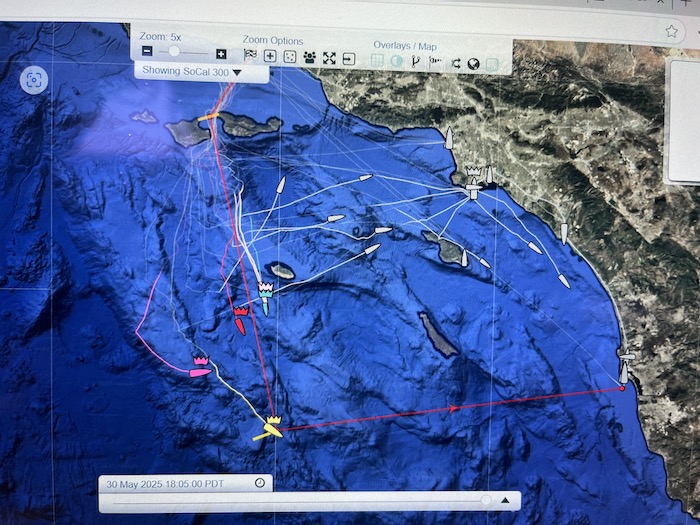
When and Why Should Race Committees Alter the Course?
Following last weekend’s SoCal 300 to San Diego, leg three of California Offshore Race Week, racer Chip Merlin wrote us concerning the race committee’s decision to not change the race course in light of the forecast winds. Ultimately, the original course remained and many boats retired from the race.

“Long before this photo was taken showing all of the retirements during the SoCal 300, we sent an email during the race to the Race Committee,” Chip wrote. “The Race Committee previously indicated at the pre-race briefing of the possibility for a shortened course at the last mark before turning to San Diego.” Chip also emailed the race committee the day before, asking if they intended to shorten the course. Their response came back as follows:
“Race Committee will not be shortening the course. Mother nature has provided marginal conditions this year. We have pondered the fairness of shortening the course at a late moment but have arrived at the decision to maintain the integrity of the course design, and premise that this is an offshore blue water race with all the exposure (or lack thereof) that comes with that.” They then likened the situation to mountain climbing. ” … sometimes there is not time to climb the mountain in the time allotted and in the prevailing conditions.”
While we can see their point, Chip has presented a different perspective on the matter. He continues. “I dedicated my book, Mavericks and Merlins, to the hard work of race committees. They are the unsung heroes who make our sport possible. I write this with the utmost respect. Race committees ensure safety, fairness, and challenge. They allow us to enjoy our beloved sport. But when decisions result in only five boats remaining on the course, boats scattered and spirits frayed, we have to ask: What memories will competitors, and others thinking about participating, take from this day? And more importantly, will they want to return or experience this sport?
“Sailboat racing, especially at the non-Grand Prix level, is as much about camaraderie as competition. Many of us come not just to test our boats and crews, but to see old friends and make new ones at the dock after the finish. That community spirit, that post-race connection, is as integral to our sport as any mark on the course. When decisions are made that diminish those human elements, we risk losing something far more important than a clean start; we risk losing people who stop coming back.
“This discussion isn’t about complaining or second-guessing under pressure. It’s about fostering a conversation about how we balance the integrity of course design with the reality of wind, participation, and the experience of all competitors. Especially in events not at the cutting edge of the racing circuit, shouldn’t we also champion accessibility, inclusion, and joy?
“I hope we can talk more openly about this, not to point fingers, but to reflect on how we keep this sport vibrant and welcoming for the broad community it serves.”
We also see Chip’s point and agree there is some merit in his argument. Merlin has opened the discussion, and now we’re asking for your thoughts. Would it be better to shorten the course and enable more sailors to experience the full race, or let the chips fall where they may?
You can see the race results here.
